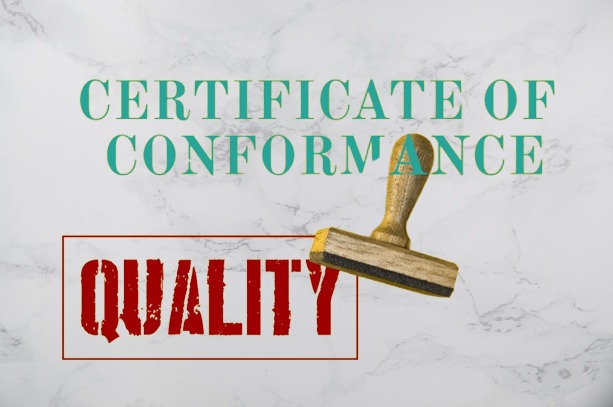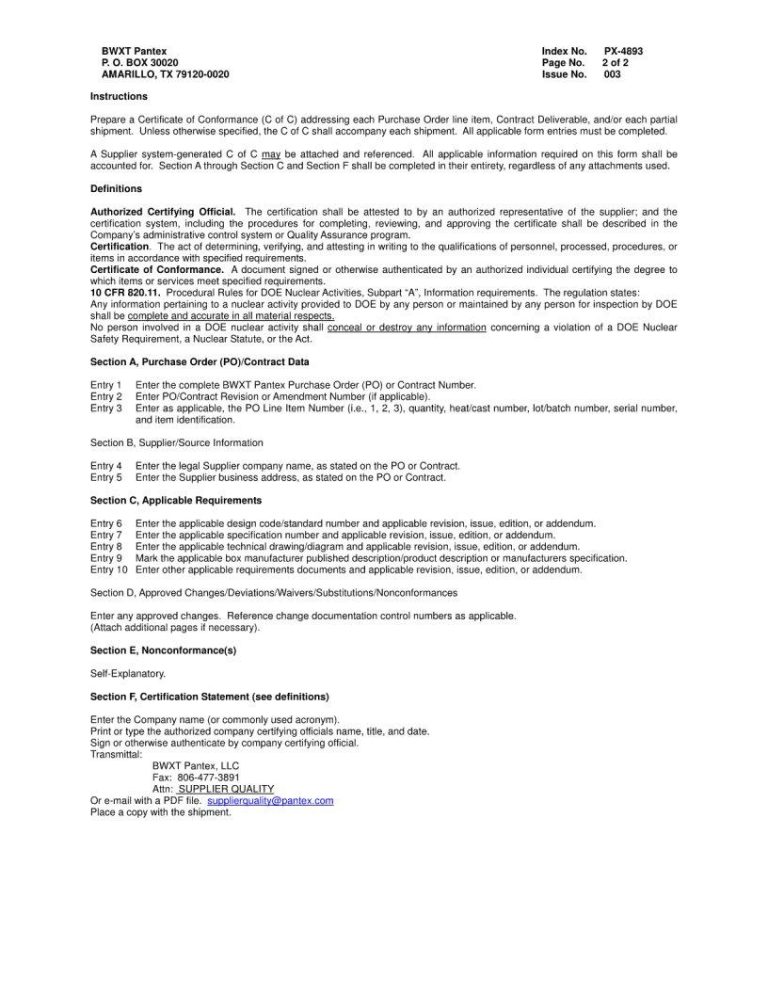
When importing from countries like China, Vietnam, Thailand, or India, many buyers might not fully understand what a “certificate of conformance” (CoC) really means. This article aims to shed light on the concept and answer common questions related to this essential document, often abbreviated as CoC. Understanding the certificate of conformance , its significance, and how it impacts your imports is crucial for a smooth international trade process.
Table of Contents
ToggleWhat is a Certificate of Conformance ?
A Certificate of Conformance (CoC) is a formal declaration that a product or service meets the required standards and regulations. Issued by the manufacturers or certified authorities, it verifies that the product has been tested and conforms to the international or specific regulatory standards.
The document includes vital compliance details, ensuring that the product or service satisfies the necessary criteria to uphold quality and safety. It serves as a protective measure for consumers in importing countries, shielding them from products that could be hazardous or below standard.
Furthermore, adhering to established standards and obtaining a certificate of conformance can make the inspection process more efficient, improving process effectiveness and easing the path to market access.
What is Certificate of Conformance vs. Compliance?
The main difference often lies in the scope and application. A Certificate of Conformance is typically more focused on meeting specific standards and specifications, while a Certificate of Conformance is broader, emphasizing adherence to regulations and legal requirements.
Another difference can be in who issues the certificate. A Certificate of Conformance is often issued by an independent third party or certifying body, while a Certificate of Conformance can be issued by the manufacturer itself, declaring that their product meets the necessary regulatory standards.
In practice, the distinction between the two can be minimal, and the specific requirements for each will depend on the industry sector, the nature of the product, and the regulatory environment. Both certificates play crucial roles in ensuring product quality, safety, and regulatory adherence.
Essential Elements of a Certificate of Conformance
A Certificate of Conformance must include several key elements to ensure it fulfils its purpose of certifying a product or service’s adherence to specific standards and regulations. The required information typically includes:
- Manufacturer or Supplier Information: Name and address of the manufacturer or supplier issuing the certificate.
- Product Identification: Detailed description of the product, including model numbers, specifications, and any relevant identification details.
- Standards or Regulations: A list of the specific standards or regulations that the product complies with. This could include international standards, industry-specific standards, or national regulations.
- Testing Information: Details of any tests that have been carried out on the product to verify compliance, including test dates and test results.
- Date of Issue: The date on which the certificate was issued.
- Authorized Signature: Signature of an authorized individual from the manufacturer or supplier who is responsible for certifying the product’s compliance.
- Certificate Number: A unique identifier for the certificate, which can be used for verification purposes.
Optionally, the certificate may also include additional information such as the validity period of the certification, any limitations on the use of the product, and references to the documentation or records that support the certification.
The Certificate of Conformance serves as a crucial document in international trade, providing assurance to buyers, regulators, and end-users that the product meets all required standards for quality, safety, and performance.
A Certificate of Conformance (COC) can indicate a product’s adherence to European directives with CE marking, or compliance with specific standards like ISO 9001:2008. This document serves as proof that a product meets established regulatory criteria.
Certificate of Conformance Template


How Do I Get a Certificate of Conformance?
Typically, the product’s manufacturer will supply a Certificate of Conformance (COC), though an independent lab may issue it in some instances. Buyers can request to see the COC to verify the product meets all required testing and safety standards, ensuring it’s safe for use. Compliance with these standards is often obligatory.
When Should You Request the Certificate of Conformance (CoC) from Your Supplier?
Asking your supplier for a Certificate of Conformance (CoC) is crucial to ensure the products meet regulatory standards and quality requirements. Here are pivotal moments to request a CoC:
- Before Placing an Order: Confirm product compliance in advance.
- During Supplier Evaluation: Use CoC availability to assess supplier quality and compliance.
- When Exploring New Products or Suppliers: Verify compliance for new market entries.
- For Ongoing Supplier Assessments: Regularly update CoCs to maintain quality over time.
- Following Regulatory Updates: Ensure products adhere to the latest industry standards.
- For Key Components: Specifically request CoCs for critical parts or materials.
- Addressing Quality Concerns: Use CoCs to address and resolve product quality issues.
- For Export/Import Processes: Facilitate customs and international trade with the necessary CoCs.
Notable Agencies for Certificate of Conformance Validation
Before choosing a certification agency for issuing a Certificate of Conformance , ensure the agency is recognized by the destination country’s regulatory bodies. This pre-verification step ensures the certificate’s acceptance and compliance within the target market.
Several well-known certification agencies globally are recognized for their authority in issuing Compliance Certificates. These agencies cover a wide range of industries, ensuring products meet international standards and regulatory requirements.
- UL (Underwriters Laboratories): Specializes in safety certification for a wide range of products, focusing on electrical and electronics sectors.
- Intertek: Offers broad certification and testing services across consumer goods, chemicals, and energy sectors.
- SGS (Société Générale de Surveillance): A global company providing inspection, verification, testing, and certification across various industries including agriculture and automotive.
- Bureau Veritas: Focuses on testing, inspection, and certification services in maritime, oil and gas, and construction industries.
- TÜV Rheinland: Provides certification services for industries like automotive, industrial, and IT.
- NSF International: Known for certification and testing in food safety, water quality, and consumer goods.
- FM Global: Offers property insurance and certification services related to property loss prevention.
- DEKRA: Specializes in certification services for automotive, industrial, and construction sectors.
- SGS North America: A division of SGS catering specifically to North American clients with regulatory compliance and standards.
- Applus+: A global company in testing, inspection, and certification for automotive, aerospace, and energy industries.
- CCIC (China Certification & Inspection Group): Provides certification and inspection services to facilitate exports from China.
- TUV SUD: Offers certification services across healthcare, energy, and mobility sectors.
- DNV GL: Specializes in certification and assurance services for maritime, energy, and healthcare industries.
What's the distinction between a COA, COC, and CE?
purpose
The Certificate of Conformance (COC) serves as a declaration that a product meets all specified regulatory standards, ensuring it can legally be sold in certain markets. The Certificate of Analysis (COA) details specific tests conducted on products and their results, focusing on quality and specification compliance. The CE mark indicates that a product meets EU safety, health, and environmental requirements, allowing it to be sold within the European Economic Area. Each serves a distinct purpose in product verification, regulatory adherence, and market access.
issuing bodies
The issuing bodies for these certificates vary: COCs are usually issued by regulatory agencies or through third-party certification bodies to confirm compliance with specific standards. COAs are provided by the manufacturer or an independent lab to detail product testing results. The CE mark is a self-declaration by the manufacturer that the product meets EU standards, but for certain categories, a notified body must verify compliance. Each body plays a crucial role in ensuring products meet safety, quality, and regulatory requirements before reaching the market.
the scope of what they certify
The scope of what they certify differs significantly: COCs verify that a product meets specific regulatory standards or industry specifications. COAs detail the specific test results for individual batches of products, focusing on their composition and quality. The CE mark certifies that a product complies with EU safety, health, and environmental protection directives. Each certificate covers a different aspect of product verification, from general compliance to specific quality metrics and adherence to comprehensive European regulations.
Certificate of Conformance(COC) Examples
In international trade, a Certificate of Conformance (COC) or Certificate of Conformity is essential, acting as proof that products meet the destination country’s regulatory standards. This document is crucial for customs clearance, verifying that items such as electronics, toys, automotive parts, and medical devices comply with local laws and standards before they are allowed entry:
- Pharmaceuticals: Requires a COC for international shipments to ensure they adhere to rigorous health and safety standards, safeguarding consumers across borders.
- Chemicals: Mandates a COC for both hazardous and non-hazardous chemicals, ensuring they meet international safety and environmental standards before shipment.
- Food: A COC is necessary for all exported food products, ensuring they comply with global food safety and quality regulations to protect consumer health.
- Vehicles: Vehicles being exported need a COC to confirm they meet the importing country’s safety, emissions, and regulatory standards.
- Electronics: A COC is required for international shipments of electronic goods to certify they meet specific safety and operational standards set by the destination country.
These expanded details underscore the importance of COCs in ensuring the safety, quality, and compliance of products across a range of industries.
Conclusion
Our commitment to upholding the highest standards is evident in our issuance of a Certificate of Conformance (CoC), a testament to our products’ adherence to regulatory requirements. This commitment underscores our dedication to excellence and safety across our range.
If you have questions about the CoC or need advice on finding a reliable certification agency, feel free to contact us. Our team at SKAB is always here to help, offering expert advice and support in navigating the certification process.
At SKAB, we believe in a collaborative approach to quality, involving our customers, partners, and the broader community in maintaining standards that build trust and confidence. Our experienced professionals are ready to provide consultancy and support, guiding you through integrating advanced technological solutions into your business for enhanced quality assurance.
